- Home
- M. K. Hume
M. K. Hume [King Arthur Trilogy 04] The Last Dragon Page 16
M. K. Hume [King Arthur Trilogy 04] The Last Dragon Read online
Page 16
None of his envy showed on his bland face, but he determined to bring up the subject of the Dragon Knife with Bedwyr as soon as possible, as training with this weapon would affect the schedule that Germanus was planning for his charge. The boy was already tall for his age, and he promised to be an extraordinary physical specimen when he put some years behind him. To wield such a knife, he would need to build up muscle in both arms. A good swordsman should always be able to use either hand with ease, but such ambidexterity was not possible for most men.
But, more important, the man who had used this knife did not use a shield. To hold off a skilled adversary with a sword and a knife alone left no room for error or carelessness. Arthur must be trained to become unusually fast to be worthy of this weapon, for only speed could counteract an unexpected blow if he had no shield to protect him.
And so, as he carefully planned Arthur’s training strategy, Germanus decided to devote part of each day to exercises that would build up the boy’s physical strength and speed. When asked, Bedwyr avoided explaining Arthur’s relationship with the original owner of the Dragon Knife, so Lorcan and Germanus, the two outsiders in Arden, spent many fruitless hours speculating on the mystery surrounding their pupil. In the absence of any answers, except the fact that the boy must learn to use the knife, Germanus devised a regime specifically for that purpose. Weights would build muscle, so Arthur was given pieces of scrap iron that could be lifted and tossed from hand to hand whenever the boy was free of lessons. The size of the weights would be steadily increased as Arthur developed muscle tone.
But Germanus wanted more than simple muscle, for Arthur must become more than just a muscle-bound brute. The boy was also encouraged to climb and run, not that he needed very much urging to do what all lads love. In some ways, Arthur was disappointed that this regimen was considered work, but Germanus was clever enough to explain his strategy after observing his charge’s daily activities. When Arthur understood the implications behind the differing modules used in his training, he soon became an eager and diligent student. The arms master began to appreciate Arthur’s enquiring mind.
‘So I need to build up my strength and speed,’ Arthur repeated, his brows knitted with concentration.
‘In a nutshell, lad, yes.’
‘It seems wrong somehow to enjoy my training, don’t you think, master? But I like my lessons in Latin, so I suppose it makes sense that climbing trees and running every day could be fun and still be useful. I think I understand what you want.’
This child is unnatural, Germanus thought. At his age, all I bothered about was mountains of food on my plate and endless play. What have the gods given me to work with? He sounds like an old man – but one who has charm, an even more dangerous gift than his physical strengths. He must be trained to understand the right paths that a man should follow to achieve his ends.
Germanus and Lorcan discussed their pupil on many occasions over jugs of ale, and both agreed that they were fortunate in being asked to mentor a pupil who was rarely argumentative or bad tempered. But Germanus remembered the mental image of a double-sided axe that had leapt into his mind when he met Arthur for the first time. Such a friendly, outgoing child seemed innocuous, but the arms master had seen both sides of his nature.
Animals loved Arthur. The huge, shaggy dogs that were so beloved by the Romans in times of war clustered around him, drawn by wordless communication with a boy who both ruled and loved them. His devotion extended to horses, donkeys, cats and even the small creatures of the forest that he killed as part of his hunting. But he never permitted any animal to suffer, even if it would ultimately flavour his stews. Animals killed for food died swiftly and relatively painlessly at his hands as he worked to keep their velvet eyes mesmerised by his own pale gaze. He believed that the guardians of Arden were duty bound to care for every creature, useful or otherwise, that dwelt within the boundaries of the forest.
Bedwyr had been concerned for some time that trap-lines were being set along the northern borders of Arden. While peasants needed to live, and the bounty of the forest was free to all men who needed to feed their families, he had come across a number of trapped beasts who had been left to die of thirst so that removal of their pelts was easy and trouble-free. Arthur had been with his father when they found the corpse of one obviously pregnant roe who had been caught by a leg-snare. The animal had broken her leg in her frantic struggles to free herself, and Bedwyr was forced to turn away from the terrified death-stare of the deer when he saw what had been done to the poor creature.
The hunter had left the simple twine trap that remained embedded in the flesh of her delicate foreleg, for its removal would take time and a replacement was easily made. Most of the carcass was untouched, although her hide with its faint, beautiful winter markings had been taken, and the hunter had carved away the choicest joints of venison.
Germanus, who was Arthur’s shadow whenever they left the palisades of Arden, glanced down at the lad’s pale face, and what he saw there concerned him far more than the barbarity of the roe’s death. Under his sheet-white complexion, the boy’s expression was set in uncompromising lines and his eyes were white with suppressed fury and horror. None of his mother’s forest-green gentleness was visible in their unspoken desire to make the perpetrator of this crime pay for such cruelty. Germanus almost took an instinctive step backward at the repressed violence in the boy’s fixed stare.
‘I swear, Lorcan, if Bedwyr had caught the peasant who had killed that deer so casually, Arthur would have needed to be restrained. He’d have killed the hunter with that little knife he uses, regardless of how big his adversary was. I’ve occasionally seen that killing rage before, and I’m afraid for our pupil if he carries such a depth of aggression within him.’
‘Our boy is as sunny tempered as a sweet spring evening,’ Lorcan said, the poetry of his people in his blood overriding the responses of a practical, phlegmatic ex-mercenary. ‘I’ve never seen what you describe, but I’ve heard rumours that he has a temper at times. We all do, so we shouldn’t hold his occasional fits of anger against him. From what you describe, the peasant who butchered the deer deserves to be cuffed around a little.’
‘You didn’t see young Arthur’s eyes, Lorcan, so you don’t understand. They were like flat panes of glass, and I saw right through them to read the punishment he’d have meted out if he had the chance. What I saw in those eyes wasn’t pretty – not remotely.’
‘You’re exaggerating, boyo,’ Lorcan soothed. ‘Any soft-hearted lad would feel the same as Arthur did.’
Germanus shook his head, rejecting the inadequacy of words to describe the subtle, murderous, violence that lived deep below the boy’s charm. But he began to plan a series of exercises that would teach Arthur how to control his emotions, although even the boy’s detractors would probably have denied that such precautions were needful to protect the world from a seven-year-old boy.
The weeks sped past and winter settled over Arden like a cloak of white. The snow came early and, with it, frozen mud and sleet. Suddenly, the daily runs ceased to be quite so pleasurable. With Germanus’s blessing, Arthur began to range further and further from his home as he ambled towards the eastern margin of the trees in an effort to develop his growing stamina. Sundays, which should have been spent in practising his letters or in religious studies, saw him travelling deep into the forest clad in heavy furs and stout snow boots, a pouch of food slung over one shoulder. For protection, he was armed with the sharp knife on his belt, his sling round his neck, a collection of pebbles and a tinderbox in a leather bag, weaponry that should be suitable for any eventuality.
One particular Sunday, after a heavy overnight snowfall, Arthur broke his fast in the kitchen long before sunrise. The cold had forced him to break an icy plug that covered the surface of a barrel of water beside the kitchen doorway before he could fill a hide container to take with him during his ramble through the woods. Donning his trekking gear, he collected cold food for his pouch and se
t off with a cheerful wave to the disgruntled guards on the palisades.
‘The young master’s off again. Damn me, but he’s growing like a weed, all legs and elbows and hair,’ one of the guards grumbled to his companion to break the tedium of a freezing morning. Both men were looking forward to a bowl of porridge and hot, spiced wine to chase away the chill of the freezing winds. ‘Why he’d want to go off gallivanting through the woods beats me. Fair enough in summer. Even autumn! But it’s too fucking cold to be out in the wind at this time of day. Still, I suppose even a freezing wander through Arden Forest is better than lessons with that damn priest.’
His friend crossed himself at the blasphemy, for he was a Christian. Both men watched the lanky boy stride away between the trees and disappear into the morning darkness. They shrugged at the oddities of the great ones and soon forgot him.
Deep in the shadows of the trees, where the dawn’s light couldn’t reach, even when it stained the open sky, Arthur felt at one with his world. Within his cocoon of furs he was warm, and he liked the nip of cold air on his cheeks and nose, and the stirring of his blood when he breathed in the gelid air.
Around him, the silence was broken by cracks, growls, moans and thuds as tree limbs strained under the weight of snow like old men rising from their beds and shaking off their blankets. Large white lumps fell from high branches, causing thuds and clatters that continued down to the forest floor. In the distance, Arthur heard a smaller tree as it fell, ripped from the ground by the weight of accumulated snow that had fallen during the night. Every step the boy took broke the fresh white crust with a sharp little crunch as the animals of the forest began to stir in the early morning breeze that moaned through the sheltering trees.
Arthur looked up at the black sky through a net of bare branches and sighed with pleasure. Because he was loved and his time was fully occupied, he had no complaints about his life, but sometimes he longed to be completely alone. He had so much to try to absorb – so much to understand.
In a few short months, he had learned that his birth father was a greater man than he could have possibly imagined. He had met living legends like Gawayne and Lady Anna, and he had acquired two outstanding teachers. While the two men were very different, he liked them both, despite feeling that they chose to train him for the coin they earned for his tuition rather than affection for himself. In his cynicism, Arthur wasn’t far off the mark, because Germanus was still cautious around him and Lorcan had ceased to care for anyone very deeply after the death of his family. None the less, Germanus admired something in Arthur’s nature while remaining wary of his hidden depths, and Lorcan feared to become attached to him only because he knew he could never endure the loss of another person he loved.
The boy set forth towards the east, using the weak stain of the sun for navigation as he worked his way carefully through the woods, feeling the stretch and strain on his young thigh muscles as he avoided traps, hollows, fallen trees and hidden pits on the forest floor. His fertile imagination could conjure up the outcome of any fall: the snapping of a leg in a trap of hidden branches and the difficulties he would face in seeking assistance. Unlike most boys of his age, he took considerable care while he enjoyed his apparently aimless wanderings.
A tall oak tree claimed his attention, so he paused to climb its broad branches in order to fix his position. From the top, he had an unimpeded view of the forest and, beyond it, the rolling hill country that stretched out like a white blanket. Familiar as he was with the inhabitants of the area, he searched the landscape for the farm of Ednyfed Crookback, a peasant farmer who lived with his growing brood in a gentle fold in the hills. Crookback possessed a thriving little property where he grazed black-faced sheep and tended several acres of arable land.
Arthur observed a wisp of smoke above the tree line. Yes! He looked again. The smoke was in the general direction of the Crookback farm, but surely it was a little too dense and a little too black to be the normal result of a kitchen fire.
The boy felt a brief moment of concern. In winter, fire was the farmer’s friend, for it warmed the circular fieldstone cottages and the barns and outbuildings. But thatched roofing could catch alight by accident, and wild sparks could transform warm comfort into deadly danger. Kitchens were usually partly covered lean-tos that were designed to prevent the spread of fire, but smaller fire-pits within the one-room cottages were used for warmth during the winter months. Astute farmers ensured that the pits were guarded from anything that could easily ignite, but accidents were part of daily living.
Arthur liked Ednyfed Crookback and Cathella, his fat, pretty wife. Their four healthy children were always excited when Arthur visited, especially their eldest son, Rab, who was of a similar age. Cathella always found a cup of milk for him and a slab of bread or an apple from their stores, and he would spend an hour or two with Rab and his brothers working at the homely tasks of a farmer before the long walk home to Arden. Each time he ventured so far, he would arrive back at the palisades after dark, to the annoyance of his father and concern of his mother, so these visits were sporadic and precious. Normally, he would never intrude on their hospitality in winter when food was scarce, but the blackness and density of that finger of smoke was beginning to worry him.
‘I’ll just make sure that all is well at the farm,’ Arthur whispered to the tree trunk, before carefully making his way down to the ground again. Whistling under his breath, he set off in the direction of the finger of smoke.
Something itched in the back of his brain, a warning that told him he should exercise caution during this trek, and that dangers could lie in the forest around him. But like all healthy young animals, Arthur only believed the evidence of his five senses, so he had no hesitation in casting off the shivering alarms that lurked near the back of his skull.
Nevertheless, like a sharp fingernail drawn across the bones inside his head, the feeling of dread intensified as Arthur began to increase his pace. In the visceral part of his brain, he sensed that something was seriously wrong in the terrain that lay ahead of him. Keeping to the higher ground where the snow was thinnest, he trotted on with his mile-devouring young stride. The dark morning passed away and a pallid noon was close when the trees thinned and only the occasional copse remained to offer shelter.
The feeling of danger was strong at the back of his mind. The fingernail inside his head seemed to scratch his skull anew, and his hair stood on end at the base of his neck. With one hand shading his eyes from the glare of the snow, the boy scanned the hills below the finger of smoke that still rose, greyer and wispier now, before being dissipated by the light breeze.
There! Only young eyes could have seen it. And only someone who was already feeling a presentiment of wrongness would have bothered to look for it. Off to his left, along a ridgeline leading to a copse of trees at the crest of the small hill overlooking Crookback’s cottage, was a trail of footprints that were already blurring in the faint heat of the sun. He wasn’t alone on this chill day. At least two other travellers were abroad, and their footprints remained as silent witnesses to their passage.
The smoke was nearly gone now, but it should still be rising if a farm fireplace was its source. Indecisive, Arthur stood on the edge of the forest. He knew that the wise course would be to go home and inform his father that something was amiss, but he was concerned for the safety of the Crookback family. He also feared to appear a fool if the family should be found, well and happy, the next morning. Finally, trying to convince himself he was imagining all sorts of disasters attached to the innocent footprints of passing strangers, Arthur set off to see what secrets lay beyond the hill.
CHAPTER VII
OUTLAWS
Never break a covenant, whether you make it with a false man or a just man of good conscience. The covenant holds for both, the false and the just.
Zoroastrian scripture, ‘Avestan Hymn to Mithras’, verse 2
Panting with exertion, thigh muscles screaming with strain as he ploughed into the co
ver of the small copse, Arthur launched himself onto flat ground and collapsed, prostrating himself behind a fallen tree trunk. With a quick glance back the way he had come, he saw the clear and unmistakable scars of his footsteps in the pristine snow. Swearing and sweating, he turned his attention to the farmland spread below him.
At first, the landscape appeared undisturbed. Low walls of fieldstone had been piled up to create rudimentary pens and to protect fields of grain that had long been harvested. A stream struggled through a long line of willows at the very base of the hill, its waters half frozen and silent. The croft rested near the stream on a small rise that would protect it from rising waters in the thaw. Off to one side was a barn where the croft’s cows and single horse were stabled during the winter, along with Crookback’s chickens and any sheep that were too young or too old to forage for themselves. Here the farmer kept his grain, which was milled downstream then stored in barrels for personal use or for trade and barter. Workmanlike, the farm had flourished for a century or more, safe in the knowledge that other fortresses kept outlaws, thieves and Saxons away from these hills and the quiet, bucolic existence of Britain’s rural population.
At first glance, the farm seemed untouched, and Arthur sighed with relief. Then his eyes followed a last, dismal trail of smoke and saw that it was rising from the barn, not from the cottage.
Cupping his eyes with the heels of his hands, he struggled to shake off the snow-blindness that made details difficult to discern from a distance. There! The roof of the barn, which was made of crude wooden slabs instead of the usual thatch, was scarred along the highest point of the pitch.
‘Everything is so still,’ the boy whispered to himself to break the unnatural silence. ‘It’s all too quiet if the barn has caught fire. Surely there’d be signs that Ednyfed had fought the blaze.’

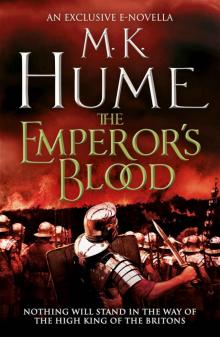 The Emperor's Blood (e-novella)
The Emperor's Blood (e-novella)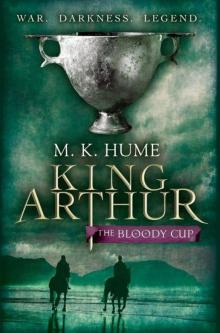 King Arthur: The Bloody Cup: Book Three
King Arthur: The Bloody Cup: Book Three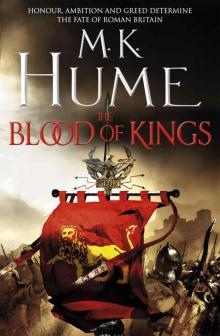 The Blood of Kings: Tintagel Book I
The Blood of Kings: Tintagel Book I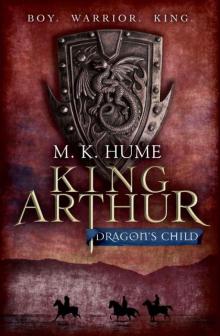 King Arthur: Dragon's Child: Book One (King Arthur Trilogy 1)
King Arthur: Dragon's Child: Book One (King Arthur Trilogy 1)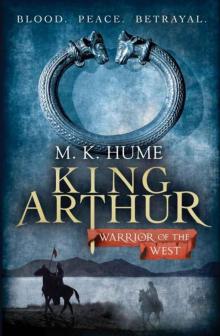 King Arthur: Warrior of the West: Book Two
King Arthur: Warrior of the West: Book Two The Storm Lord
The Storm Lord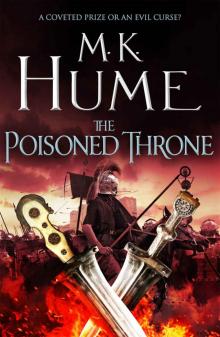 The Poisoned Throne: Tintagel Book II
The Poisoned Throne: Tintagel Book II![M. K. Hume [King Arthur Trilogy 04] The Last Dragon Read online](http://i1.bookreadfree.com/i2/04/07/m_k_hume_king_arthur_trilogy_04_the_last_dragon_preview.jpg) M. K. Hume [King Arthur Trilogy 04] The Last Dragon
M. K. Hume [King Arthur Trilogy 04] The Last Dragon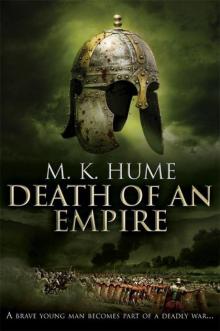 Prophecy: Death of an Empire: Book Two (Prophecy Trilogy)
Prophecy: Death of an Empire: Book Two (Prophecy Trilogy)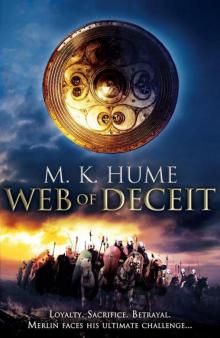 Prophecy: Web of Deceit (Prophecy 3)
Prophecy: Web of Deceit (Prophecy 3)